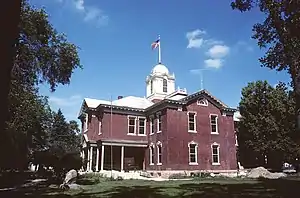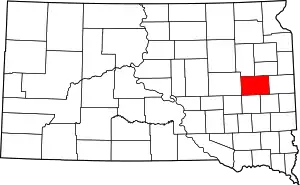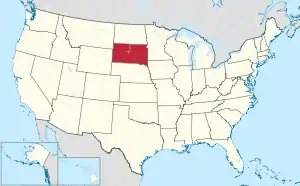Kingsbury County | |
|---|---|
 Kingsbury County Courthouse in De Smet | |
 Location within the U.S. state of South Dakota | |
 South Dakota's location within the U.S. | |
| Coordinates: 44°22′N 97°29′W / 44.37°N 97.49°W | |
| Country | |
| State | |
| Founded | 1873 (created) 1880 (organized) |
| Named for | George W. Kingsbury & T.A. Kingsbury |
| Seat | De Smet |
| Largest city | De Smet |
| Area | |
| • Total | 864 sq mi (2,240 km2) |
| • Land | 832 sq mi (2,150 km2) |
| • Water | 32 sq mi (80 km2) 3.6% |
| Population (2020) | |
| • Total | 5,187 |
| • Estimate (2022) | 5,294 |
| • Density | 6.0/sq mi (2.3/km2) |
| Time zone | UTC−6 (Central) |
| • Summer (DST) | UTC−5 (CDT) |
| Congressional district | At-large |
| Website | kingsbury |
Kingsbury County is a county in the U.S. state of South Dakota. As of the 2020 census, the population was 5,187.[1] Its county seat is De Smet.[2] The county was created in 1873, and was organized in 1880.[3] It was named for brothers George W. and T. A. Kingsbury, descendants of the colonial English Kingsbury family in Boston, Massachusetts. They were prominently involved in the affairs of Dakota Territory and served as elected members of several Territorial Legislatures.
Geography
The terrain of Kingsbury County consists of low rolling hills. The central and east portions of the county hold numerous lakes and ponds. The land is largely devoted to agriculture.[4] The terrain generally slopes to the southwest, and the highest point is near the midpoint of the east boundary line, at 1,857 ft (566 m) ASL.[5] The county has a total area of 864 square miles (2,240 km2), of which 832 square miles (2,150 km2) is land and 3.6 square miles (9.3 km2) (6.2%) is water.[6]
Lakes[4]
- Cherry Lake
- Mud Lake
- Lake Albert
- Lake Badger
- Lake Henry
- Lake Iroquois
- Lake Preston
- Lake Thisted
- Lake Thompson
- Lake Whitewood
- Osceola Lake
- Plum Lake
- Spring Lake
- Spirit Lake
- Twin Lakes (partial)
Major highways
Adjacent counties
- Hamlin County – northeast
- Brookings County – east
- Lake County – southeast
- Miner County – south
- Sanborn County – southwest
- Beadle County – west
- Clark County – northwest
Protected areas[4]
- Arnold State Public Shooting Area
Demographics
Industrialization of agriculture and the attraction of urban areas have contributed to the decline in population of Kingsbury County, similar to what has occurred in other Plains rural areas. In 2010 it had less than half the population of its peak in 1930, before the Dust Bowl and the Great Depression.
| Census | Pop. | Note | %± |
|---|---|---|---|
| 1880 | 1,102 | — | |
| 1890 | 8,562 | 677.0% | |
| 1900 | 9,866 | 15.2% | |
| 1910 | 12,560 | 27.3% | |
| 1920 | 12,802 | 1.9% | |
| 1930 | 12,805 | 0.0% | |
| 1940 | 10,831 | −15.4% | |
| 1950 | 9,962 | −8.0% | |
| 1960 | 9,227 | −7.4% | |
| 1970 | 7,657 | −17.0% | |
| 1980 | 6,679 | −12.8% | |
| 1990 | 5,925 | −11.3% | |
| 2000 | 5,815 | −1.9% | |
| 2010 | 5,148 | −11.5% | |
| 2020 | 5,187 | 0.8% | |
| 2022 (est.) | 5,294 | [7] | 2.1% |
| U.S. Decennial Census[8] 1790-1960[9] 1900-1990[10] 1990-2000[11] 2010-2020[1] | |||
2020 census
As of the census of 2020, there were 5,187 people.
2010 census
As of the census of 2010, there were 5,148 people, 2,222 households, and 1,418 families in the county. The population density was 6.2 inhabitants per square mile (2.4/km2). There were 2,720 housing units at an average density of 3.3 units per square mile (1.3 units/km2). The racial makeup of the county was 98.1% white, 0.5% American Indian, 0.3% Asian, 0.1% black or African American, 0.3% from other races, and 0.8% from two or more races. Those of Hispanic or Latino origin made up 1.4% of the population. In terms of European ancestry, 42.8% were German, 25.5% were Norwegian, 10.9% were Danish, 9.6% were Irish, 7.2% were English, and 3.5% were American.
Of the 2,222 households, 24.3% had children under the age of 18 living with them, 55.6% were married couples living together, 5.0% had a female householder with no husband present, 36.2% were non-families, and 32.2% of all households were made up of individuals. The average household size was 2.23 and the average family size was 2.81. The median age was 47.1 years.
The median income for a household in the county was $44,948 and the median income for a family was $56,925. Males had a median income of $35,585 versus $28,141 for females. The per capita income for the county was $24,660. About 7.0% of families and 9.2% of the population were below the poverty line, including 8.8% of those under age 18 and 10.8% of those age 65 or over.
Communities
Cities
- De Smet (county seat)
- Arlington (partial)
- Iroquois (partial)
- Lake Preston
- Oldham
Towns
Census-designated place
Unincorporated communities
Ghost town
Townships
- Badger
- Baker
- De Smet
- Denver
- Esmond
- Hartland
- Iroquois
- Le Sueur
- Manchester
- Mathews
- Spirit Lake
- Spring Lake
- Whitewood
Notable people
- Harvey Dunn - painter and professor of Fine Arts
- Eugene Peter Knudsen - Minnesota state legislator and farmer
- Theodore Schultz - Nobel prize winning economist
- Laura Ingalls Wilder - author
Politics
Kingsbury County voters have been reliably Republican for decades. In only two national elections since 1932 has the county selected the Democratic Party candidate (as of 2020).
| Year | Republican | Democratic | Third party | |||
|---|---|---|---|---|---|---|
| No. | % | No. | % | No. | % | |
| 2020 | 1,904 | 68.51% | 819 | 29.47% | 56 | 2.02% |
| 2016 | 1,680 | 65.86% | 703 | 27.56% | 168 | 6.59% |
| 2012 | 1,451 | 55.64% | 1,092 | 41.87% | 65 | 2.49% |
| 2008 | 1,435 | 51.54% | 1,277 | 45.87% | 72 | 2.59% |
| 2004 | 1,804 | 59.85% | 1,163 | 38.59% | 47 | 1.56% |
| 2000 | 1,612 | 59.11% | 1,049 | 38.47% | 66 | 2.42% |
| 1996 | 1,297 | 43.22% | 1,357 | 45.22% | 347 | 11.56% |
| 1992 | 1,113 | 35.41% | 1,267 | 40.31% | 763 | 24.28% |
| 1988 | 1,592 | 51.57% | 1,472 | 47.68% | 23 | 0.75% |
| 1984 | 2,121 | 62.70% | 1,249 | 36.92% | 13 | 0.38% |
| 1980 | 2,376 | 62.41% | 1,132 | 29.73% | 299 | 7.85% |
| 1976 | 1,844 | 50.98% | 1,762 | 48.71% | 11 | 0.30% |
| 1972 | 2,320 | 58.62% | 1,632 | 41.23% | 6 | 0.15% |
| 1968 | 2,300 | 58.42% | 1,491 | 37.87% | 146 | 3.71% |
| 1964 | 2,126 | 51.46% | 2,005 | 48.54% | 0 | 0.00% |
| 1960 | 2,887 | 63.26% | 1,677 | 36.74% | 0 | 0.00% |
| 1956 | 2,933 | 64.92% | 1,585 | 35.08% | 0 | 0.00% |
| 1952 | 3,703 | 78.25% | 1,029 | 21.75% | 0 | 0.00% |
| 1948 | 2,332 | 62.55% | 1,338 | 35.89% | 58 | 1.56% |
| 1944 | 2,541 | 68.73% | 1,156 | 31.27% | 0 | 0.00% |
| 1940 | 3,551 | 70.26% | 1,503 | 29.74% | 0 | 0.00% |
| 1936 | 2,813 | 55.42% | 2,037 | 40.13% | 226 | 4.45% |
| 1932 | 2,135 | 42.42% | 2,808 | 55.79% | 90 | 1.79% |
| 1928 | 3,499 | 71.88% | 1,352 | 27.77% | 17 | 0.35% |
| 1924 | 2,242 | 65.65% | 333 | 9.75% | 840 | 24.60% |
| 1920 | 2,344 | 71.66% | 481 | 14.70% | 446 | 13.63% |
| 1916 | 1,339 | 51.80% | 1,096 | 42.40% | 150 | 5.80% |
| 1912 | 0 | 0.00% | 747 | 34.52% | 1,417 | 65.48% |
| 1908 | 1,537 | 60.70% | 799 | 31.56% | 196 | 7.74% |
| 1904 | 1,896 | 77.67% | 344 | 14.09% | 201 | 8.23% |
| 1900 | 1,330 | 58.10% | 868 | 37.92% | 91 | 3.98% |
| 1896 | 950 | 46.82% | 1,051 | 51.80% | 28 | 1.38% |
| 1892 | 951 | 46.28% | 175 | 8.52% | 929 | 45.21% |
See also
References
- 1 2 "State & County QuickFacts". United States Census Bureau. Retrieved August 11, 2023.
- ↑ "Find a County". National Association of Counties. Archived from the original on May 31, 2011. Retrieved June 7, 2011.
- ↑ "Dakota Territory, South Dakota, and North Dakota: Individual County Chronologies". Dakota Territory Atlas of Historical County Boundaries. The Newberry Library. 2006. Archived from the original on April 2, 2018. Retrieved March 30, 2015.
- 1 2 3 Kingsbury County SD Google Maps (accessed February 5, 2019)
- ↑ ""Find an Altitude" Google Maps (accessed February 5, 2019)". Archived from the original on May 21, 2019. Retrieved February 5, 2019.
- ↑ "2010 Census Gazetteer Files". United States Census Bureau. August 22, 2012. Retrieved March 26, 2015.
- ↑ "Annual Estimates of the Resident Population for Counties: April 1, 2020 to July 1, 2022". Retrieved April 2, 2023.
- ↑ "U.S. Decennial Census". United States Census Bureau. Retrieved March 26, 2015.
- ↑ "Historical Census Browser". University of Virginia Library. Retrieved March 26, 2015.
- ↑ Forstall, Richard L., ed. (March 27, 1995). "Population of Counties by Decennial Census: 1900 to 1990". United States Census Bureau. Retrieved March 26, 2015.
- ↑ "Census 2000 PHC-T-4. Ranking Tables for Counties: 1990 and 2000" (PDF). United States Census Bureau. April 2, 2001. Archived (PDF) from the original on October 9, 2022. Retrieved March 26, 2015.
- ↑ Leip, David. "Atlas of US Presidential Elections". uselectionatlas.org. Retrieved April 15, 2018.
External links
Further reading
- Johnson, Lyle R. "Decades of Drought: A Year by Year-by-Year Account of Weather-Related Changes in 1930s Kingsbury County," South Dakota History 43 (Fall 2013), 218–44.